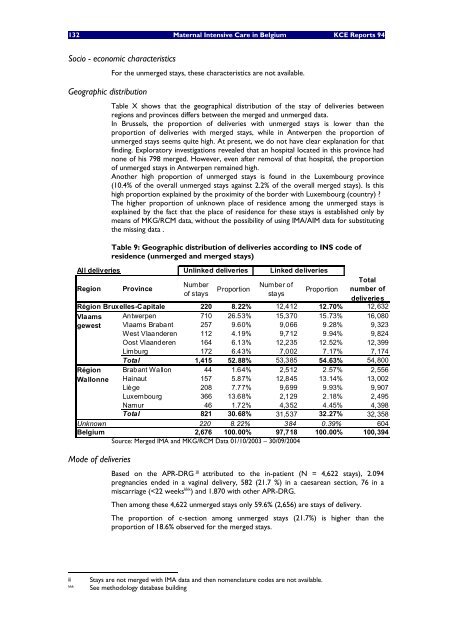Soins maternels intensifs (Maternal Intensive Care) en Belgique - KCE
Soins maternels intensifs (Maternal Intensive Care) en Belgique - KCE
Soins maternels intensifs (Maternal Intensive Care) en Belgique - KCE
You also want an ePaper? Increase the reach of your titles
YUMPU automatically turns print PDFs into web optimized ePapers that Google loves.
132 <strong>Maternal</strong> <strong>Int<strong>en</strong>sive</strong> <strong>Care</strong> in Belgium <strong>KCE</strong> Reports 94<br />
Socio - economic characteristics<br />
Geographic distribution<br />
All deliveries<br />
For the unmerged stays, these characteristics are not available.<br />
Table X shows that the geographical distribution of the stay of deliveries betwe<strong>en</strong><br />
regions and provinces differs betwe<strong>en</strong> the merged and unmerged data.<br />
In Brussels, the proportion of deliveries with unmerged stays is lower than the<br />
proportion of deliveries with merged stays, while in Antwerp<strong>en</strong> the proportion of<br />
unmerged stays seems quite high. At pres<strong>en</strong>t, we do not have clear explanation for that<br />
finding. Exploratory investigations revealed that an hospital located in this province had<br />
none of his 798 merged. However, ev<strong>en</strong> after removal of that hospital, the proportion<br />
of unmerged stays in Antwerp<strong>en</strong> remained high.<br />
Another high proportion of unmerged stays is found in the Luxembourg province<br />
(10.4% of the overall unmerged stays against 2.2% of the overall merged stays). Is this<br />
high proportion explained by the proximity of the border with Luxembourg (country) ?<br />
The higher proportion of unknown place of resid<strong>en</strong>ce among the unmerged stays is<br />
explained by the fact that the place of resid<strong>en</strong>ce for these stays is established only by<br />
means of MKG/RCM data, without the possibility of using IMA/AIM data for substituting<br />
the missing data .<br />
Table 9: Geographic distribution of deliveries according to INS code of<br />
resid<strong>en</strong>ce (unmerged and merged stays)<br />
Region Province<br />
Région Bruxelles-Capitale<br />
Vlaams<br />
gewest<br />
Région<br />
Wallonne<br />
Unlinked deliveries Linked deliveries<br />
Number<br />
of stays<br />
Proportion Number of<br />
stays<br />
Proportion<br />
Total<br />
number of<br />
deliveries<br />
220 8.22% 12,412 12.70% 12,632<br />
Antwerp<strong>en</strong> 710 26.53% 15,370 15.73% 16,080<br />
Vlaams Brabant 257 9.60% 9,066 9.28% 9,323<br />
West Vlaander<strong>en</strong> 112 4.19% 9,712 9.94% 9,824<br />
Oost Vlaander<strong>en</strong> 164 6.13% 12,235 12.52% 12,399<br />
Limburg 172 6.43% 7,002 7.17% 7,174<br />
Total 1,415 52.88% 53,385 54.63% 54,800<br />
Brabant Wallon 44 1.64% 2,512 2.57% 2,556<br />
Hainaut 157 5.87% 12,845 13.14% 13,002<br />
Liège 208 7.77% 9,699 9.93% 9,907<br />
Luxembourg 366 13.68% 2,129 2.18% 2,495<br />
Namur 46 1.72% 4,352 4.45% 4,398<br />
Total 821 30.68% 31,537 32.27% 32,358<br />
Unknown 220 8.22% 384 0.39% 604<br />
Belgium 2,676 100.00% 97,718 100.00% 100,394<br />
Source: Merged IMA and MKG/RCM Data 01/10/2003 – 30/09/2004<br />
Mode of deliveries<br />
Based on the APR-DRG jjj attributed to the in-pati<strong>en</strong>t (N = 4,622 stays), 2.094<br />
pregnancies <strong>en</strong>ded in a vaginal delivery, 582 (21.7 %) in a caesarean section, 76 in a<br />
miscarriage (

















